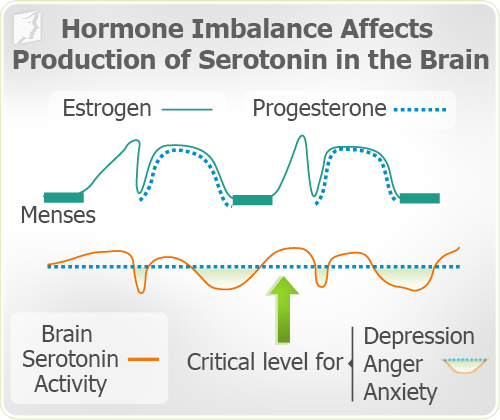Did you know?
During the stage prior to menopause, called perimenopause, estrogen levels can jump drastically, which effectively increases serotonin levels and causes spikes in mood.
Mood swings during menopause are primarily due to hormonal fluctuations women experience during this time. Hormones such as estrogen influence the production of serotonin, which is a mood-regulating neurotransmitter.
Many additional factors can trigger mood swings during menopause, including other menopause symptoms, such as hot flashes, night sweats, physical changes, and fatigue. Continue reading to learn more about the causes of mood swings in order to manage your symptoms.
Hormonal Causes of Mood Swings
The hormones estrogen and progesterone play a major role in the brain's regulation of mood and emotion. When hormone levels are naturally balanced, an individual is more likely to have appropriate emotional responses to her environment.
However, mood swings may affect a woman during periods of hormonal change, such as puberty, menstruation, pregnancy, postpartum, and menopause.
During menopause, the body begins to decrease its production of reproductive hormones. This change in hormone levels disturbs the body's natural equilibrium, which can affect a woman's emotions and her moods.
Estrogen and the Brain
Estrogen plays a large role in the brain's production of serotonin. Because perimenopausal hormone imbalances temporarily affect serotonin production in the brain, there is an increased chance of mood swings, depression, and other psychological disturbances during menopause.

While hormonal imbalance is thought to be a major underlying cause of mood swings during menopause, experts point out that mood fluctuations can also be caused or triggered by other menopause symptoms.
Estrogen's Effects on Serotonin
- Increases serotonin receptor sensitivity
- Increases serotonin receptor levels
- Increases serotonin production
Keep reading to find out how other menopause symptoms can affect mood.
Other Causes of Mood Swings
Menopausal Causes of Mood Swings
- Night sweats
- Hot flashes
- Sleep problems
- Fatigue
Women in their 40s and 50s - often overwhelmed already by work and home stresses - may suffer from fatigue, hair loss, bloating, sleep problems, hot flashes, and other symptoms that can directly contribute to mood swings.
Caution
Estrogen and progestin hormone replacement therapy (HRT) can cause side effects including breast tenderness, headache, nausea, fluid retention, and mood swings.
Night sweats can disturb sleep, leading to irritability, fatigue, trouble concentrating, and mood swings during the day. During the day, hot flashes can make a woman more temperamental because of the additional stresses caused by these intense and disruptive episodes.
Physical menopausal changes such as vaginal dryness, weight gain, migraines, and other ailments can increase irritation and discomfort, making the occurrence of mood swings more likely.
Going through all these hormonal changes can be exhausting for women. The resulting fatigue may also contribute to disturbances in emotion. Keep reading to learn more about treatments for mood swings.
Sources
- Amin, Z. , Canli, T. & Epperson, C.N. (2005). Effects of Estrogen-Serotonin Interactions on Mood and Cognition. Behavorial and Cognitive Neuroscience Reviews, 4(1), 43-58. Retrieved from http://www.ncbi.nlm.nih.gov/pubmed/15886402
- Love, S. & Lindsey, K. (2003). Dr. Susan Love's Menopause and Hormone Book. New York: Three Rivers Press.
- Office on Women's Health. (2010). Menopause and mental health. Retrieved April 12, 2016, from http://womenshealth.gov/menopause/menopause-mental-health/



